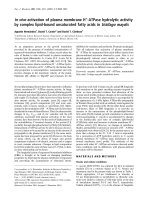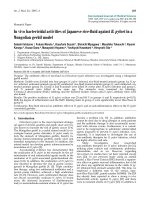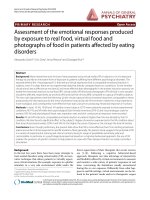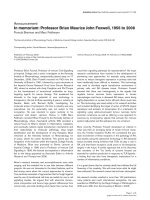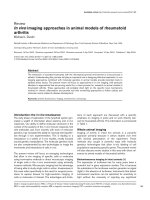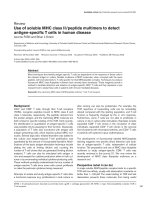Báo cáo y học: "In memoriam: Professor Brian Maurice John Foxwell, 1956 to 2008" potx
Bạn đang xem bản rút gọn của tài liệu. Xem và tải ngay bản đầy đủ của tài liệu tại đây (444.64 KB, 2 trang )
Available online />Page 1 of 2
(page number not for citation purposes)
Professor Brian Foxwell, Professor of Immune Cell Signalling
at Imperial College and a senior investigator at the Kennedy
Institute of Rheumatology, unexpectedly passed away on 17
December, 2008. Brian Foxwell received his PhD from the
University of Bristol in 1981, followed by a post doctorate at
the Imperial Cancer Research Fund (now Cancer Research
UK), where he worked with Andy Creighton and Phil Thorpe
on the development of monoclonal antibodies as drug-
targeting agents for cancer therapy. This awakened his
interests in the huge potential of new technology in
therapeutics; this led to Brian spending 3 years in industry at
Sandoz, Basle with Bernard Ryffel, investigating the
molecular action of cyclosporin. His time in industry was very
educational, but his personality was not suited to this
occupation. He was reluctant to agree routinely to his
superiors’ and elders’ opinions. Hence, in 1989 Marc
Feldmann recruited Brian Foxwell to the Kennedy Institute of
Rheumatology, where rheumatoid arthritis (RA) provided a
natural focus for Brian’s interest in inflammation, mediators,
and eventually cytokine signal transduction mechanisms and
their relationships to molecular pathology, drug target
identification and the development of new therapies. Brian
remained at the Kennedy Institute of Rheumatology for
21 years, where his career flourished. This period saw the
integration of the Institute within the Imperial College Faculty
of Medicine. Brian was promoted to Senior Lecturer at
Imperial College in 1996 and to Professor of Immune Cell
Signalling in 1999. His interest and expertise in inflammation
led to him being appointed as Associate Editor to Arthritis
Research and Therapy from 2006.
Brian’s research interests and accomplishments were wide
ranging, and this enabled him to see links between different
projects. He was not interested in the latest fashions, and he
had strong views about the correct approaches to science.
Two particular examples of approaches that he fought against
was the use of transformed cell lines as models for use in cell
signalling studies. He argued that with abnormal chromo-
some composition and hence huge genetic differences from
normal cells, and cells dividing much faster than normal, how
could their signalling pathways be representative? His major
research contributions have resulted in the development of
pioneering new approaches, for example using adenoviral
vectors to induce transgene expression in primary cells that
have traditionally been difficult to transfect. This technology
was used to elucidate signal transduction mechanisms in
primary cells and RA disease tissue. Professor Foxwell
showed that there was heterogeneity in the signals that
regulate tumour necrosis factor expression in human
macrophages and those in diseased RA tissue, some being
highly dependent on nuclear factor-κB and others much less
so. This technology was used widely in his research activities
and included identifying the target of action of STAT3 (signal
transducer and activator of transcription 3) in interleukin-10
signalling using adenovirus-based tumour necrosis factor
promoter constructs, as well as defining a new approach to
vaccines by incorporating signals that activate the immune
system (adjuvants) and the epitopes into one construct.
More recently, Professor Foxwell developed an interest in
what was then an emerging family of innate immune recep-
tors, the Toll-like receptors (TLRs). He considered the pos-
sible involvement of these receptors in the pathology of RA,
and studies using the adenoviral technology in RA diseased
tissue provided strong evidence that TLRs do play a role in
RA, and that these receptors could prove to be therapeutic
targets in the future. A similar approach led to his discovery
that members of the Tec family of tyrosine kinases are
essential for cytokine production in response to TLR ligands -
a finding that may also have therapeutic implications for a
number of inflammatory conditions.
It is a great shame that his untimely death has inhibited the full
flowering of his creativity. We will never know what he might
have achieved if his research career had not been interrupted.
His research studies resulted in more than 150 publications,
many patents and much international recognition. He was
awarded an FRCPath by the Royal College of Pathologists in
2005 and a DSc from the University of Bristol in 2006.
Announcement
In memoriam: Professor Brian Maurice John Foxwell, 1956 to 2008
Fionula Brennan and Marc Feldmann
The Kennedy Institute of Rheumatology, Faculty of Medicine, Imperial College London, Aspenlea Road, London W6 8LH, UK
Corresponding author: Fionula Brennan,
Published: 27 February 2009 Arthritis Research & Therapy 2009, 11:104 (doi:10.1186/ar2628)
This article is online at />© 2009 BioMed Central Ltd
Arthritis Research & Therapy Vol 11 No 1 Brennan and Feldmann
Page 2 of 2
(page number not for citation purposes)
Brian had many interests outside science, including philoso-
phy, religion, politics and football; he was a passionate
Chelsea fan, and his ability to discuss the details of the latest
match was legendary. He is survived by his wife Karen, to
whom he was married for 23 years, and his three children,
Kim, Kristen and John, of whom he was very proud. His family
were all well known at the Kennedy Institute, particularly his
two daughters, who had spent summer vacations working at
the Institute. Kim was instrumental in setting up an Institute
archive for laboratory books and Kristen was a prize-winning
Nuffield summer scholar, investigating inflammatory signalling
in adipose tissue.
Brian will be greatly missed by his many friends and colleagues
throughout the Kennedy Institute and further afield. He leaves
behind a team of extremely active and enthusiastic
researchers at the Kennedy Institute, whose careers have
been indelibly shaped by his untiring enthusiasm for science
and his ability to see ‘the wood for the trees’. They continue
to pursue many of the recent projects that Brian initiated.
Figure 1
Professor Brian Maurice John Foxwell, 1956 to 2008.
